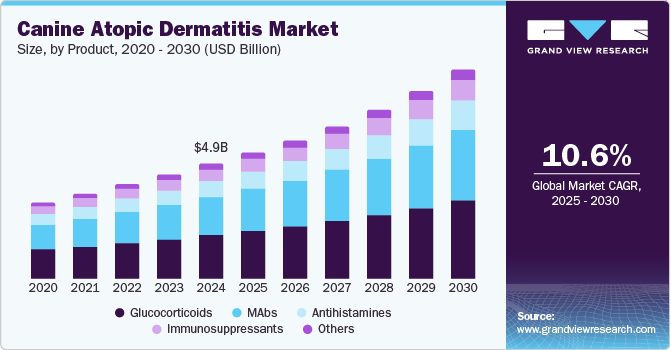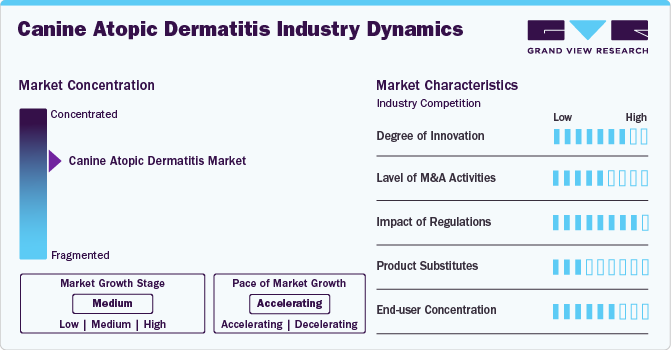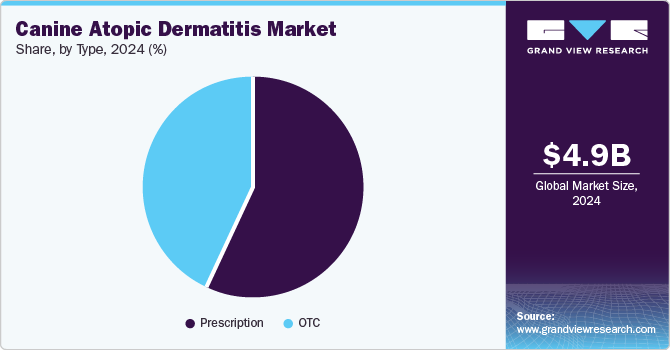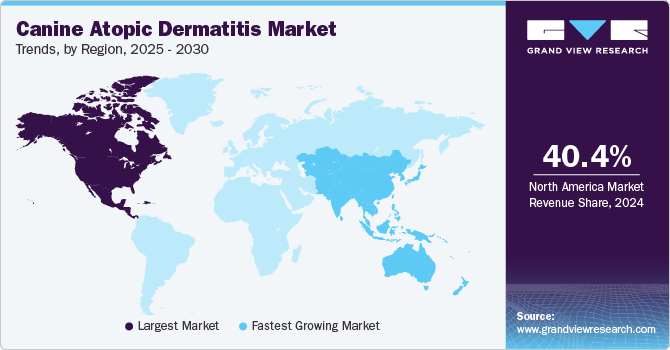- Home
- »
- Animal Health
- »
-
Canine Atopic Dermatitis Market Size, Industry Report, 2030GVR Report cover
![Canine Atopic Dermatitis Market Size, Share & Trends Report]()
Canine Atopic Dermatitis Market (2025 - 2030) Size, Share & Trends Analysis Report By Product (Glucocorticoids, Antihistamines), By Type, By Dog Breed, By Mode Of Administration, By Indication, By Distribution Channel, By Region, And Segment Forecasts
- Report ID: GVR-4-68038-179-5
- Number of Report Pages: 100
- Format: PDF
- Historical Range: 2018 - 2023
- Forecast Period: 2025 - 2030
- Industry: Healthcare
- Report Summary
- Table of Contents
- Segmentation
- Methodology
- Download FREE Sample
-
Download Sample Report
Canine Atopic Dermatitis Market Summary
The global canine atopic dermatitis market size was estimated at USD 4,862.5 million in 2024 and is projected to reach USD 8,780.1 million by 2030, growing at a CAGR of 10.6% from 2025 to 2030. Increasing incidence of atopic dermatitis in dogs, fueled by air pollution and allergens, is a key market driver.
Key Market Trends & Insights
- In terms of region, North America was the largest revenue generating market in 2024.
- Country-wise, India is expected to register the highest CAGR from 2025 to 2030.
- In terms of segment, glucocorticoids accounted for a revenue of USD 1,598.8 million in 2024.
- MAbs are the most lucrative product segment registering the fastest growth during the forecast period.
Market Size & Forecast
- 2024 Market Size: USD 4,862.5 Million
- 2030 Projected Market Size: USD 8,780.1 Million
- CAGR (2025-2030): 10.6%
- North America: Largest market in 2024
Some of the most common symptoms associated with atopic dermatitis are scratching, itching, foul odor, loss of hair, and scaly skin. The breeds found to be most susceptible to this canine atopic dermatitis are Labrador and golden retrievers, German shepherds, and pugs. Rapid industrialization in the developing and developed countries is anticipated to further propel the market growth.
The rising prevalence of canine atopic dermatitis and advancements in veterinary medicine drive significant market growth. Increasing cases of skin allergies in dogs have led to higher demand for effective treatments. Innovations such as Monoclonal Antibodies (MAbs) and improved immune suppressants enhance therapeutic outcomes, fueling market expansion. Research continues to introduce novel therapies, improving treatment efficacy and accessibility. Furthermore, growing awareness among pet owners and the availability of specialized veterinary dermatology services contribute to the increased adoption of advanced treatments, reinforcing the market’s upward trajectory.
The rising demand for pet insurance and increasing care & concern among pet owners are expected to drive the canine atopic dermatitis industry. Pet insurance provides financial support for veterinary treatments, encouraging owners to seek advanced dog care. With growing awareness of pet health, owners have become more proactive in addressing dermatological issues. This trend, along with improved insurance coverage, fuels the demand for effective treatments, expanding the market. In addition, the availability of comprehensive insurance plans covering dermatological conditions further supports market growth.
Market Concentration & Characteristics
The market growth stage is medium, and the pace of growth is accelerating. Ongoing efforts by major market participants, including pharmaceutical companies and research organizations, have resulted in concentrated market scenarios. These players drive innovation through the development of new treatments and therapies. Strategic collaborations, investment in clinical trials, and enhanced product offerings expand the market’s reach. Continuous advancements in treatment options, such as biologics and immunotherapy, address unmet needs and improving the quality of care, ultimately driving market growth and providing better outcomes for affected pets.
The global market is characterized by a high degree of innovation owing to the growing adoption of modern healthcare technologies. Telemedicine, AI-driven diagnostics, and digital health tools enable more accurate detection and treatment of the condition. Integration of wearable devices allows for real-time monitoring of symptoms, facilitating personalized care. These technological advancements improve efficiency, reduce treatment costs, and empower pet owners and veterinarians to manage the condition more effectively, thereby expanding the market scope.

The growing regulations significantly impact the canine atopic dermatitis market by ensuring the safety and efficacy of treatments. Regulatory bodies like the FDA and EMA set stringent guidelines, fostering trust among consumers and healthcare professionals. Regulatory approval accelerates the availability of new drugs and therapies, encouraging innovation and investment within the market. In addition, these regulations help establish quality standards, which contribute to the overall growth of the market by promoting the development of reliable, effective treatment options for affected pets. For instance, in September 2024, the U.S. FDA approved Zenrelia (ilunocitinib tablets), a new drug for dogs aged 1 year and older, to manage pruritus (itching) linked to allergic dermatitis and control atopic dermatitis caused by environmental allergies.
Product Insights
The glucocorticoids segment dominated the market with the largest revenue share of 38.3% in 2024 due totheir effectiveness in managing inflammation and allergic reactions. Veterinarians frequently prescribe these corticosteroids for rapid relief from itching and skin irritation. Their affordability and widespread availability make them a preferred treatment option. Extensive research and clinical validation have reinforced their role in dermatological care for dogs, leading to high adoption rates among pet owners seeking reliable solutions.
The MAbs segment is anticipated to grow at the fastest CAGR of 11.2% from 2025 to 2030, owing totheir targeted approach in managing allergic reactions. Lokivetmab (Cytopoint) has demonstrated high efficacy in reducing itching and inflammation, making it a preferred choice among veterinarians. Increasing pet healthcare awareness and advancements in veterinary medicine contribute to the growing demand for MAb-based therapies. Pharmaceutical companies continue to invest in research, further accelerating the adoption of these innovative treatments.
Type Insights
The prescription segment accounted for the largest market share in 2024, attributed toits effectiveness in managing severe cases. Veterinarians frequently recommend prescription medications such as corticosteroids, immunosuppressants, and MAbs for targeted relief. Increased pet healthcare awareness and advancements in veterinary dermatology have further driven the demand for prescription-based therapies. The availability of specialized treatments through veterinary clinics and hospitals has strengthened the segment’s market position, ensuring reliable solutions for pet owners seeking effective management of canine atopic dermatitis.

The OTC segment is expected to be the fastest-growing segment in the canine atopic dermatitis industry during the forecast period, propelled byits accessibility and affordability. Pet owners increasingly prefer OTC solutions such as medicated shampoos, antihistamines, and skin-soothing sprays for mild cases. Growing awareness of pet dermatological health and advancements in non-prescription formulations contribute to the rising demand. The expansion of e-commerce and retail distribution channels has further facilitated the availability of OTC treatments, making them a convenient option for managing canine skin conditions.
Dog Breed Insights
The retrievers segment held the largest revenue share in 2024 due totheir genetic predisposition to skin allergies. Golden and Labrador retrievers are among the most commonly affected breeds, leading to a higher demand for dermatological treatments. Increased pet ownership and awareness of canine skin conditions drive the adoption of veterinary consultations and treatments. Pharmaceutical companies continue to develop specialized therapies targeting retrievers, further strengthening the segment share.
The German shepherd segment is projected to grow at a significant rate during the forecast period, propelled byits susceptibility to allergic skin conditions. The thick double coat increases its predisposition to environmental allergens, driving the need for effective treatments. Rising pet healthcare awareness and advancements in veterinary dermatology contribute to the growing demand for specialized therapies. Research and development efforts focus on breed-specific solutions, enhancing treatment efficacy and driving market expansion.
Mode of Administration Insights
The oral segment accounted for the largest market share in 2024, owing toease of administration and effectiveness in managing symptoms. Pet owners and veterinarians prefer oral medications for their convenience and ability to provide consistent relief. Advances in pharmaceutical formulations have improved drug efficacy, leading to widespread adoption. Increased awareness of canine skin conditions and the availability of prescription oral therapies have strengthened this segment’s market position, making it a dominant choice for long-term management.
The injectable segment is set to experience the fastest CAGR during the forecast period, fueled byits rapid action and prolonged effectiveness. Veterinarians increasingly recommend injectable Mabs, especially Lokivetmab (Cytopoint), for targeted relief from itching and inflammation. Growing pet healthcare awareness and advancements in veterinary dermatology contribute to the rising demand. Pharmaceutical companies continue to invest in research, enhancing injectable formulations and expanding treatment options, reinforcing their emergence as a preferred solution for managing canine atopic dermatitis.
Indication Insights
The ectoparasites segment dominated the canine atopic dermatitis industry in 2024 due totheir widespread presence and role in triggering allergic reactions. Fleas, mites, and ticks are common culprits that exacerbate skin inflammation, leading to increased demand for effective treatments. Veterinary professionals prioritize ectoparasite control as a fundamental approach to managing canine atopic dermatitis. Pharmaceutical companies continue developing advanced antiparasitic solutions, ensuring pet owners can access reliable preventive and therapeutic options. Rising awareness about parasite-induced skin conditions further strengthens the dominance of this segment.
The allergic skin infections segment is anticipated to be the fastest-growing segment from 2025 to 2030, owing tothe increasing prevalence of environmental allergens affecting dogs. Pollens, dust mites, and food ingredients contribute to hypersensitivity reactions, necessitating specialized treatments. Veterinary dermatologists focus on immunotherapy and targeted medications to alleviate symptoms. Advancements in diagnostic techniques enable early detection, improving treatment outcomes. Growing pet healthcare awareness and the demand for breed-specific solutions drive pharmaceutical innovations, reinforcing the rapid expansion of this segment.
Distribution Channel Insights
The veterinary hospitals/clinics segment held the largest market share in 2024 due to their specialized expertise in diagnosing and treating dog skin conditions. Pet owners rely on professional veterinary care for accurate assessments and effective treatment plans. The availability of advanced diagnostic tools and prescription medications enhances treatment outcomes. Increased awareness of canine dermatological health and the presence of experienced veterinary dermatologists further strengthen the dominance of this segment, ensuring comprehensive care for affected dogs.
The e-commerce segment is projected to grow at the fastest CAGR during the forecast period, propelled bythe convenience it offers pet owners in accessing treatments. Online platforms provide a wide range of dermatological products, including medicated shampoos, antihistamines, and prescription medications. The expansion of digital healthcare solutions and direct-to-consumer sales channels enhances accessibility. Growing pet healthcare awareness and the increasing preference for online shopping contribute to the rising demand for e-commerce-based veterinary products.
Regional Insights
North America canine atopic dermatitis market dominated the global market with the largest revenue share of 40.4% in 2024.Advancements in veterinary medicine and rising pet healthcare spending fuel market growth. Innovative treatments, including MAbs and improved immunosuppressants, enhance therapeutic outcomes, leading to higher adoption rates. Increased investment in veterinary research drives the development of specialized dermatological solutions in the region. Pet owners are allocating more resources to advanced care, boosting demand for effective treatments. Expanding veterinary infrastructure and improved diagnostic techniques further contribute to market expansion, ensuring better management of canine skin conditions across the region.

U.S. Canine Atopic Dermatitis Market Trends
TheU.S. canine atopic dermatitis market accounted for the largest share in the regional market in 2024.The rise in telemedicine and personalized medicine is driving the growth of the U.S. canine atopic dermatitis industry. Remote veterinary consultations provide pet owners with easier access to dermatological care, increasing treatment adoption. Advanced diagnostic tools enable tailored therapies based on individual canine needs, improving outcomes. Moreover, pharmaceutical companies invest in precision medicine, developing breed-specific treatments. Increased awareness among pet owners drives demand for customized solutions. The expansion of digital healthcare platforms further enhances accessibility, reinforcing the market’s upward trajectory in specialized dermatological treatments for dogs.
Europe Canine Atopic Dermatitis Market Trends
The Europe canine atopic dermatitis market is anticipated to witness significant expansion over the forecast period, owing to increasing pet healthcare spending and the rising adoption of hypoallergenic diets. Pet owners are investing more in advanced dermatological treatments, driving the demand for specialized therapies. Hypoallergenic diets help manage allergic reactions, reduce flare-ups, and improve overall skin health in dogs. Veterinary professionals emphasize tailored nutrition plans, encouraging widespread adoption. Pharmaceutical companies and pet food manufacturers continue to innovate, enhancing treatment efficacy and dietary solutions. Expanding awareness and accessibility further strengthens the market size.
Asia Pacific Canine Atopic Dermatitis Market Trends
Asia Pacific canine atopic dermatitis market is set to be the fastest-growing region at a CAGR of 11.4% from 2025 to 2030, attributed to the shift toward novel and targeted therapies, such as biologics and immunotherapies. These advanced treatments, including MAbs and biologic drugs, offer effective relief with fewer adverse effects compared to traditional options. Moreover, the rising demand for dermaceuticals and topical treatments, such as medicated shampoos, sprays, and skin barrier products, is also contributing to regional market expansion.
India canine atopic dermatitis market is projected to grow at the fastest CAGR in the regional market during the forecast period. The growing preference for natural and holistic remedies, such as omega-3 supplements and herbal treatments, drives the demand for alternative solutions to manage canine atopic dermatitis in India. Pet owners are increasingly seeking safer, adverse-effect-free options, fueling market growth. In addition, the rise of e-commerce platforms offering a wide range of pet care products, including dermaceuticals, topical treatments, and prescription medications, enhances accessibility and convenience. This combination of holistic care trends and online shopping convenience is expected to expand the market share.
Key Canine Atopic Dermatitis Company Insights
Some of the key companies in the canine atopic dermatitis industry includeZoetis Services LLC; Merck & Co., Inc.; Elanco; Boehringer Ingelheim International GmbH; and Virbac.
-
Zoetis offers medicines, vaccines, diagnostics, and other technologies for livestock and companion animals. Its innovations support veterinarians, farmers, and pet owners to ensure animal well-being and productivity.
-
Elanco and Boehringer Ingelheim offer comprehensive animal health solutions. Elanco provides treatments for parasite control, pain management, and vaccines, while Boehringer focuses on innovative therapeutics, vaccines, and diagnostic tools for both companion and livestock animals.
Key Canine Atopic Dermatitis Companies:
The following are the leading companies in the canine atopic dermatitis market. These companies collectively hold the largest market share and dictate industry trends.
- Zoetis Services LLC
- Merck & Co., Inc.
- Elanco
- Boehringer Ingelheim International GmbH
- Virbac
- Vetoquinol
- Dechra
- Biofelix Pharma Group
- TORAY INDUSTRIES, INC.
- Bioiberica S.A.U.
- Ceva
- Bimeda, Inc.
Recent Developments
-
In September 2024, Elanco launched Zenrelia, a once-daily oral JAK inhibitor approved by the FDA to treat itching (pruritus) and atopic dermatitis in dogs. This new medication offers a targeted solution for managing allergic skin conditions in pets.
-
In April 2023, Bioiberica introduced the Atopivet Collar, a groundbreaking skin health solution for dogs and cats. This world-first product offers a convenient alternative to traditional topical and oral treatments, helping manage atopic dermatitis, a chronic condition affecting over 10% of dogs.
Canine Atopic Dermatitis Market Report Scope
Report Attribute
Details
Market size value in 2025
USD 5.31 billion
Revenue forecast in 2030
USD 8.78 billion
Growth Rate
CAGR of 10.6% from 2025 to 2030
Base year for estimation
2024
Historical data
2018 - 2023
Forecast period
2025 - 2030
Quantitative units
Revenue in USD million and CAGR from 2025 to 2030
Report coverage
Revenue forecast, company ranking, competitive landscape, growth factors, and trends
Segments covered
Product, type, dog breed, mode of administration, indication, distribution channel, and region
Regional scope
North America; Europe; Asia Pacific; Latin America; Middle East & Africa
Country scope
U.S.; Canada; Mexico; U.K.; Germany; France; Italy; Spain; Denmark; Sweden; Norway; Japan; China; India; Australia; South Korea; Thailand; Brazil; Argentina; South Africa; Saudi Arabia; UAE; Kuwait
Key companies profiled
Zoetis Services LLC; Merck & Co., Inc.; Elanco; Boehringer Ingelheim International GmbH; Virbac; Vetoquinol; Dechra; Biofelix Pharma Group; TORAY INDUSTRIES, INC.; Bioiberica S.A.U.; Ceva; and Bimeda, Inc.
Customization scope
Free report customization (equivalent up to 8 analysts working days) with purchase. Addition or alteration to country, regional & segment scope.
Pricing and purchase options
Avail customized purchase options to meet your exact research needs. Explore purchase options
Global Canine Atopic Dermatitis Market Report Segmentation
This report forecasts revenue growth at global, regional, and country levels and provides an analysis of the latest industry trends in each of the sub-segments from 2018 to 2030. For the purpose of this study, Grand View Research has segmented the global canine atopic dermatitis market report on the basis of product, type, dog breed, mode of administration, indication, distribution channel, and region:
-
Product Outlook (Revenue, USD Million, 2018 - 2030)
-
Glucocorticoids
-
Antihistamines
-
Immunosuppressants
-
MAbs
-
Others
-
-
Type Outlook (Revenue, USD Million, 2018 - 2030)
-
Prescription
-
OTC
-
-
Dog Breed Outlook (Revenue, USD Million, 2018 - 2030)
-
German Shepherd
-
Terriers
-
Retrievers
-
Others
-
-
Mode of Administration Outlook (Revenue, USD Million, 2018 - 2030)
-
Oral
-
Topical
-
Injectable
-
-
Indication Outlook (Revenue, USD Million, 2018 - 2030)
-
Ectoparasites
-
Food Allergy
-
Allergic skin infections
-
Others
-
-
Distribution Channel Outlook (Revenue, USD Million, 2018 - 2030)
-
Veterinary Hospitals/Clinics
-
Retail
-
E-commerce
-
-
Regional Outlook (Revenue, USD Million, 2018 - 2030)
-
North America
-
U.S.
-
Canada
-
Mexico
-
-
Europe
-
U.K.
-
Germany
-
France
-
Italy
-
Spain
-
Denmark
-
Sweden
-
Norway
-
-
Asia Pacific
-
Japan
-
China
-
India
-
Australia
-
South Korea
-
Thailand
-
-
Latin America
-
Brazil
-
Argentina
-
-
Middle East & Africa
-
South Africa
-
Saudi Arabia
-
UAE
-
Kuwait
-
-
Share this report with your colleague or friend.
Need a Tailored Report?
Customize this report to your needs — add regions, segments, or data points, with 20% free customization.

ISO 9001:2015 & 27001:2022 Certified
We are GDPR and CCPA compliant! Your transaction & personal information is safe and secure. For more details, please read our privacy policy.
Trusted market insights - try a free sample
See how our reports are structured and why industry leaders rely on Grand View Research. Get a free sample or ask us to tailor this report to your needs.










